Two Jews discuss the Jewishness of Dwarves: an Interview! (Part 2)
In which the conversation continues, including discussions of the Hobbit, Fanfiction, Gender, and Rings of Power.
This is part two of an interview/conversation I had with a fellow Jewish acafan, Berakha Guggenheim, about the Jewishness of Dwarves. Please see part one with a full explanation Here!
As a reminder: while this conversation was somewhat light and between friends, we do discuss serious issues of antisemitism as well as Zionism in relation to The Hobbit. This was unavoidable in this discussion, as it was unavoidable in my conference paper. While doing this work, and at the time of this post, the state of Israel has been committing ethnic cleansing and genocide against Palestinians in the name of Zionism. We must understand and grapple with the difference between Zionism as a pre-Israel concept and Zionism as a mechanism of Israeli Imperialism. The State of Israel does not represent Jews across the world, nor are all Jews Zionists, and I do not take this conversation lightly. I highly recommend reading the Jewitches article “The Three Israels” which clearly and accessibly explains the three different uses of the word Yisrael, and how they should not be conflated.
If you have the funds to do so, please consider donating to any Gazan relief fund, or any of the following organizations:
PCRF: Palestinian Children’s Relief Fund
Islamic Relief Fund
Amnesty International
Doctors Without Borders
Na’amod: British Jews Against Occupation
IfNotNow: American Jews Against Occupation
And now, back to the conversation!
Mercury: So now, dig deep into your soul for me. What are some specific aspects of the dwarves that feel like home to you?
Berakha: Besides being short and hairy?
Mercury: [ laughs ] Yes, but we can get to that too.
Berakha: There are certain obvious things, so let's get this out of the way: Dispossessed people in Middle-earth, but not of Middle-earth, who are mostly good, but somewhat problematic (which is itself a problematic portrayal). A people who came first, but weren't supposed to [in a Christian worldview]. They speak a language and keep a culture all their own with secret names. The connection with money (unfortunately). They are a permanent other in the society of Middle-earth. There’s so much. It's like, just say Jewish. This is taking too long.
It wasn’t surprising but it was very interesting when I saw, immediately, how many of my Jewish non-fandom-obsessed peers were like, oh yeah, [ The Hobbit movie ] is about the Jews. Of course this movie is about the Jews. I'm just glad that they were mostly making parallels between the Roman Empire and the dragon and not anybody else. I didn't see anything else like that, thank God for small favours.
[ The conversation again digressed into the personal, before we returned to the topic at hand, specifically about Cecil Roth: ]
Mercury: One really interesting thing is that Cecil Roth was an avid collector of Judaica. One thing that I wonder is if some of what Tolkien got about Gimli's appreciation for beautiful things came from his relationship with one particular Jewish art collector.
Berakha: I never thought about that, that's a fascinating connection. I remember there was a fanfiction called Sansukh, and a bunch of us on Tumblr were talking with the author: A very lovely white woman. I mention that she was white because, while most of the fandom tends to trend white, there were a number of Jews who were talking with her, and I was one of them. And I remember one of the conversations I had was about interrogating the antisemitism in the text while engaging with it and trying to fill in the blanks, which is what fanfiction does–Fanfiction is like Midrash, it is an elaboration on the text. And this conversation we had was about physical objects as repositories of history.
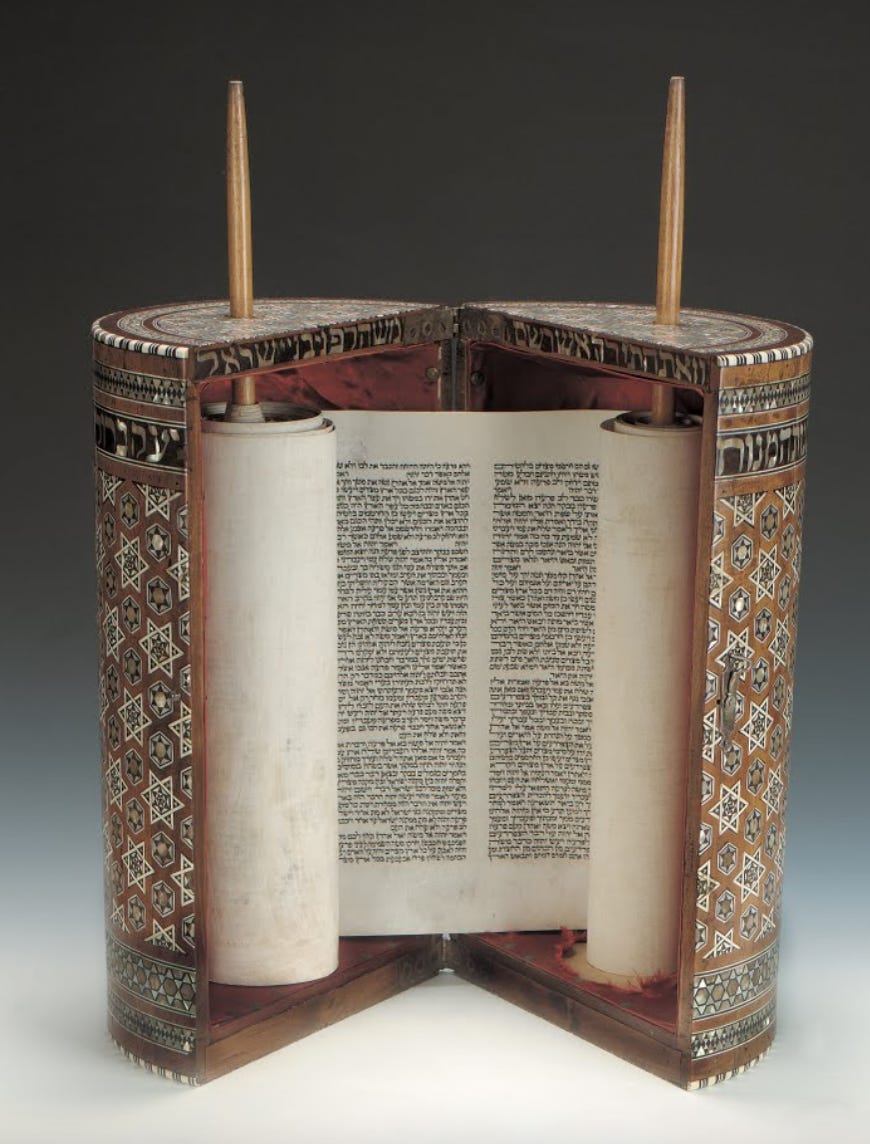
She had mentioned that she hadn't really considered that before. So many items that are textual are also objects d’art. They don't just have a ritual purpose. They also have a historical purpose, they're also symbols of history, and that was a way to ameliorate this obsession with the material that we see in The Hobbit, but this obsession with the material was also uncritically reproduced in the fandom. What does it mean when we talk about objects as history, and then we talk about the Arkenstone? Was this ever Bilbo's to give away? It wasn't. He's a thief. What does this mean? The context of Thorin's anger at the theft of the Arkenstone actually is justified. Despite the fact that, ultimately, it is that theft that helps pave the way to some sort of resolution, some sort of political and moral resolution, it was still a terrible crime done to an already dispossessed people. That conversation has lived in my mind rent-free for a while because of that. I don't think a lot of people really necessarily consider objects like that, because they don't necessarily come from a culture that is using objects in that way.
Mercury: That is one of those things that I feel really resonates–that as a culture, we tend to appreciate the importance of the object.
Berakha: Right, because the object itself has history, the object is a text, is related to the text. I'm not saying other cultures don't have that, because it is actually fairly common, but I don't think it's fairly common in the culturally go-to-church-only-on-Easter-and-celebrate-Christmas Christian West.
Mercury: It is with Catholics though, which is interesting.
Berakha: I was really very, very careful in my description. It's such a thing with Catholics, and I think Tolkien understood that. But I don't think most modern fans do, because it's not part of their daily lives. Why would they? But it is part of our daily lives. There's a fundamentally different relationship with the item in our lives as more than just the tool.
Mercury: Another thing that I found resonates for me–this is much more present in the Jackson films, but it is present in the text as well, that Gimli has this ability to turn a struggle into a comedic moment.
Berakha: It’s really Ashkenazi!! Extremely Ashkenazi!!! Why do they give him a Scottish brogue? He’s obviously from Brooklyn. [ Laughs ]
Mercury: This is so different in The Hobbit films. In The Lord of the Rings films, Gimli is rarely the butt of the joke, and when he is the butt of the joke, he turns it into lemonade. He makes it funnier as a choice, by leaning into it and not retreating in embarrassment. The perfect example is his “zero chance of success, what are we waiting for?” line. It’s this idea that you can take these really difficult situations and make joy out of it, make humour out of it, make comedy out of it, without undermining the grim sincerity of the situation. This is something we are historically excellent at doing. And in The Hobbit, that's not the case. The dwarves are very much the butt of the joke a lot of the time.
Berakha: I noticed that as well. I also think part of this is an evolution in Tolkien's writing and Tolkien's understanding of the repercussions of his text. The Hobbit is meant to be a funny story for a five-year-old.
Mercury: Exactly, but The Hobbit films didn't have to do that.
Berakha: The Hobbit films didn’t have to do that. The Hobbit films wanted to make a buck.
[ On the dwarves in Rings of Power: ]
Mercury: For a roundtable for a conference [previously posted in its entirety here], I talked about gender essentialism and Rings of Power and how it's completely shoehorned in. It's not in the original text. Of course, one of the things I talk about is why these dwarf women do not have beards. It is a political point.
Berakha: It's just that we see a dwarf woman in the Hobbit films. They show very feminine, very sweet little beards. As you saw with the dwarf woman cosplay [seen below], I had mutton chops and a soul patch for my cosplay.
Mercury: Right, it’s totally doable.
Berakha: There was such a range of possibilities that you could do without just skipping it. I don't even have PCOS and I have more hair than they have on the show?? What is that?
Mercury: I do have PCOS, and I shave my face weekly, but I also do that for gender reasons.
Berakha: My mom’s got a moustache she lightens. Anybody who's Italian, Arab, North African, Turkish, or Jewish, understands that struggle. And that's not even... It's not always a hormone issue. It's just normal human diversity that's common among these various related Mediterranean ethnic groups.
Mercury: It makes me really angry that people have started making jokes about those of us complaining about the dwarf women not having beards because they are completely missing the point. This isn't about what is canon and what isn't canon. It's about radical representation that is widely accepted as canon.
Berakha: I completely agree, but I think it's also what is or isn't canon. Stop ignoring canon because you have weird gender feelings that are bad and wrong about it. But also... Well, it was ridiculous. I was looking forward to that and I was disappointed. That being said, I find the Jewishness of the dwarves and Rings of Power severely reduced. I appreciate that they show what a friendship of equals looks like between a dwarf and an elf because we haven't seen that. They weren't thrown together by fate, destiny and a quest. They chose to be friends as equals, as representations of these very, very important major power players in society, and they love each other at potentially great personal cost.
And I thought that was very, very interesting. I think because it's such a beautiful representation, it doesn't feel Jewish because when have we ever been equal as minorities living at the will of the governing power? We have to rely on other people to agree to protect us because they have to agree to see us as human or see us as worth protecting. That doesn't feel equal, does it? But that lack of equality is seen in the Third Age as diminished people, unfortunately. Looking at a Second Age television show where they’re equals: It's beautiful, but because it's equal, it doesn't feel Jewish. It doesn't represent the 2000 years of diaspora experience of the Jewish people, even when things are good. That doesn't make us equal power-players.
Usually, the cost of trying to be an equal power player is incredible assimilation and/or conversion out of Judaism, and you're still treated as a permanent foreign other anyway. So, I haven't really seen a lot of what I would call Jewishness in the dwarves of Rings of Power, but I'm holding out for some Shabbat candles or something somewhere. We'll see. At least there's Khuzdul in it. At least they show that they have a culture of their own, with beauty, art and architecture.
Mercury: Thank you for this conversation, it’s been very useful. Do you have anything else that you would like to add?
Berakha: We didn't get a choice about what Tolkien chose to write, and we didn't get a choice in what Tolkien chose to represent, and we don't get a choice in how society sees us. But we do have a choice about whether we choose to embrace things or not. I think the parts of Jewish fandom that do embrace dwarves are having a very important dialogue about what it means to be seen by a majority Other, and what it means when the majority Other (in this case, one member, one white man) chooses to try to do better in his own lifetime. I think a lot of Gentile fandom misses that. That's the lesson I want them to take from him.

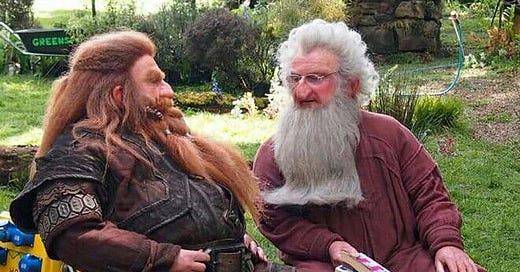



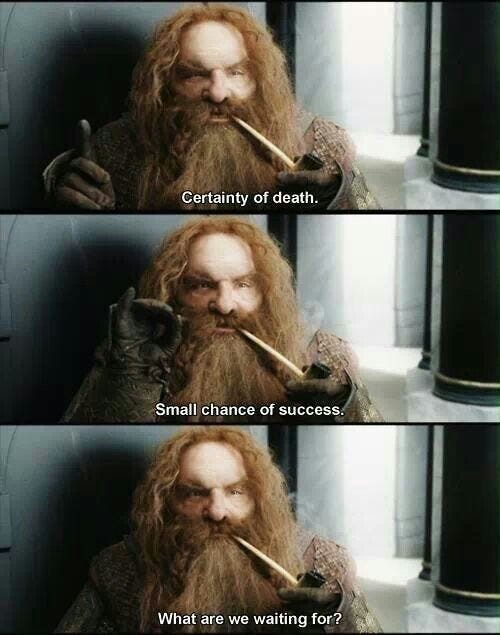
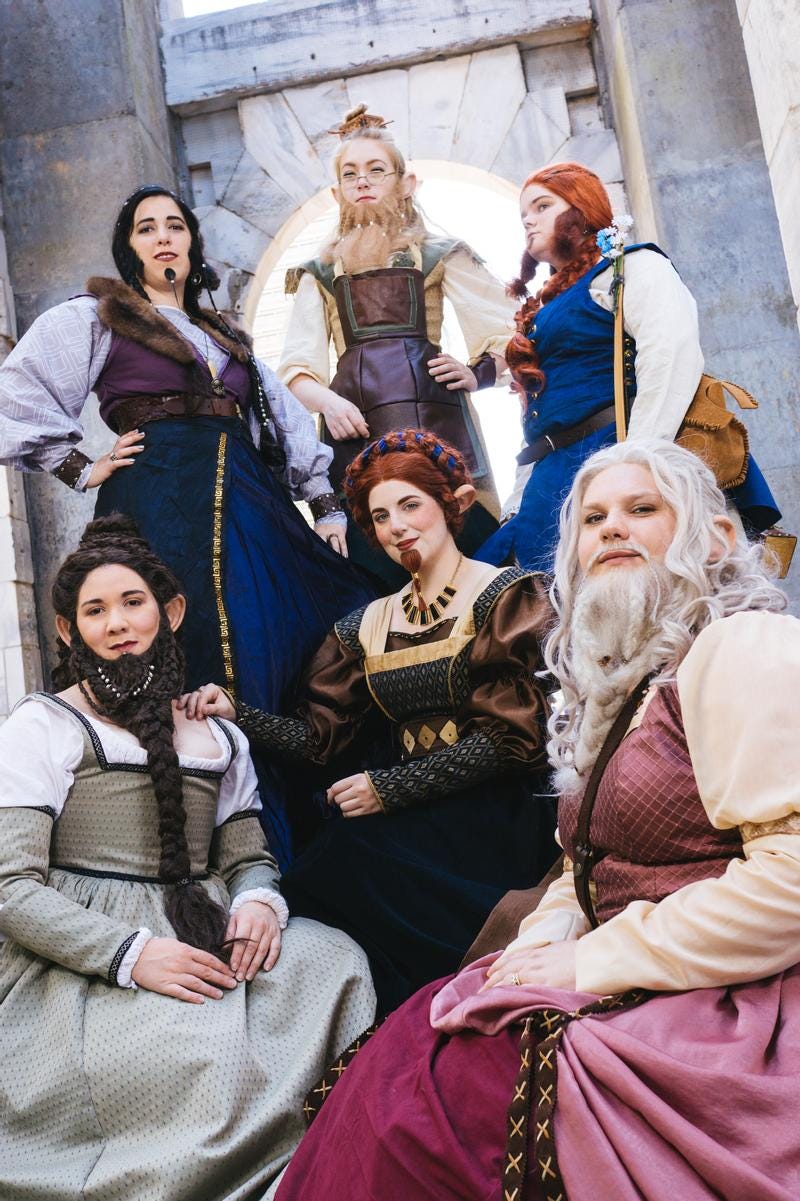
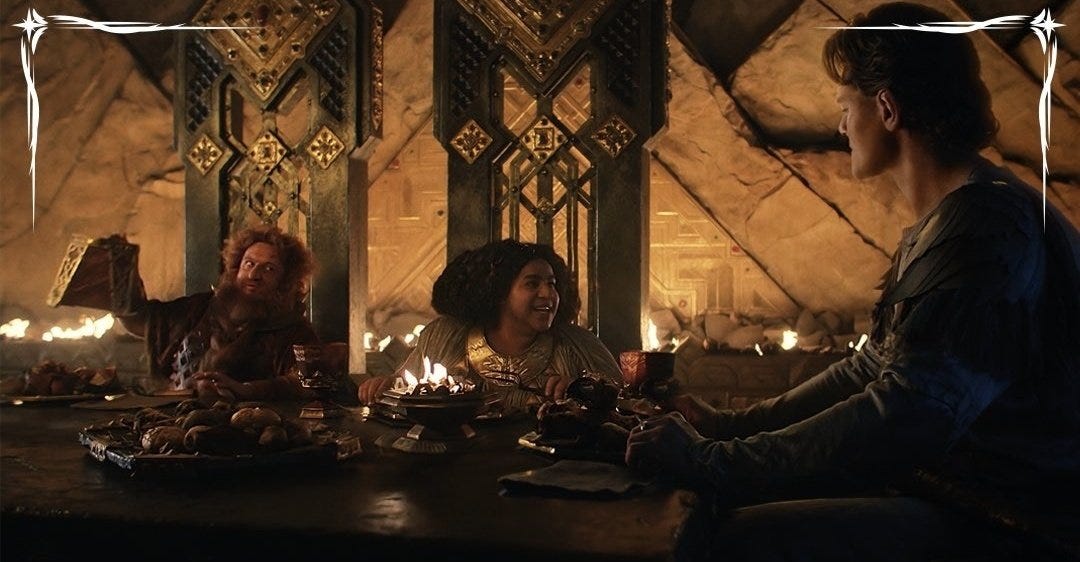
Just read through both parts and thoroughly enjoyed and appreciated the conversation! I learned a lot and it's given much food for thought. Would love to dive even deeper into what Tolkien changed over the course of his lifetime so I'll definitely be checking out your paper presentation as well.